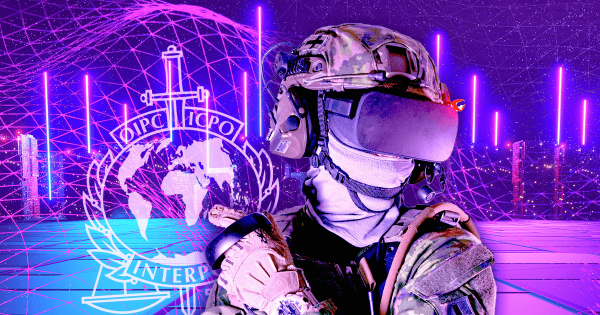Enforcing law and order is a challenge to any community. Enforcement in a digital one brings a whole host of new challenges, as Twitter and Facebook have discovered in the past decade. How might authorities in the metaverse ensure that citizens follow the rules, and prevent the communities within them from being harmed?
The Differences and Challenges
As the boundary between the physical and digital world continues to blur, ensuring people are kept safe in the latter is of paramount importance. The metaverse is often cited as the next stage in the development of the web; laws must be made to keep it safe.
Some crimes might actually be easier to prevent in the metaverse than in the physical world, theft being one. Ownership can be verified using NFTs and public blockchains, hardware biometrics could be used for user verification. Any form of verification would ideally work across all metaverses, similar to how a wallet such as Metamask, can be used across different Dapps (decentralized applications) today. The technology will undoubtedly have to advance to fight identity fraud in the metaverse, but it seems like there are already some effective solutions.
One of the main features of current Web2 technologies is anonymity. A bot or person can open a social media account and start inciting violence or creating rifts between communities without any way to trace the content back to them. It’s still surprising how easy this is to do given the huge impact social media plays in our lives today. In the metaverse, however, this will probably be more difficult.
Forcing each user to sign up with a wallet attached to their accounts across other platforms (similar to how Metamask works today) makes it much harder for people to enter one world, cause a problem, and then leave, without facing consequences.
Of course, it’s hard to say at the moment given the nascency of the technology, but it seems that many of the problems we face in the physical world, could be totally, or at least partly fixed in the metaverse.
Perhaps the main challenge of policing the metaverse is trying to control a world in which borders don’t exist. When an individual can move freely between worlds, can one just commit a crime in metaverse X and then move to metaverse Y without facing “extradition”? Much of this is unclear at the moment but will be decided as the technology developers and the number of users grows.
How Might Crime be Fought in the Metaverse?
Agencies and Governments
Governments are being urged to think about how to regulate the metaverse now. In October 2022, a team of researchers working for the French government advised the EU to avoid making the mistakes made with crypto when creating regulations for the metaverse. They said that EU lawmakers should start to develop General Data Protection Regulation (GDPR) and the Digital Services Act (DSA) to cover data collection and user protection in the metaverse now rather than waiting until its popularity has grown.
In October 2022, INTERPOL launched its first ever “police metaverse” where users can tour a virtual replica of the INTERPOL headquarters in France. Officers can interact with other officer avatars, and even participate in training courses for forensic investigation. INTERPOL plans to make future forays into the metaverse, saying “The Metaverse holds many benefits for law enforcement, notably in terms of remote work, networking, collecting and preserving evidence from crime scenes, and delivering training.”
INTERPOL also announced the creation of a group of experts aimed specifically at researching how to fight crime in the metaverse. According to Gartner, by 2026, around 25% of people will spend at least an hour a day in the metaverse.
EUROPOL’s innovation lab released a report in June 2022 giving European law agencies guidance on how to approach law enforcement in the metaverse. They said it’s important for governments to build an online presence now and educate users on how to safely enter the metaverse and experience it without becoming a victim.
Having the worlds leading enablers of police cooperation at the front of the Web3 revolution, shows just how important law agencies are taking the development of the metaverse and the laws within it.
 INTERPOL launched its first “police metaverse” in October 2022 to help train and educate the next generation of global law enforcement.
INTERPOL launched its first “police metaverse” in October 2022 to help train and educate the next generation of global law enforcement.
Companies
Companies are vital to the creation of the metaverse. Without the teams of engineers working on it, development would slow to a snail’s pace. Nonetheless, how important they are to policing the worlds they create (and how good they are at it) is debatable.
As we’ve seen with social media, despite their best efforts, these multi-billion dollar companies can find it difficult to deal with monitoring content at scale. In the metaverse, this becomes even harder; it’s not only by message that users can interact.
If one user goes into a world and “murders” another, should a company be able to decide how they’re punished, and will different companies have different rules for serious crime in the metaverse? Given that today, companies struggle to cope with controlling hate speech online, can we really trust them with “murder” in the digital realm?
Another issue is data. We’ve already seen how controversial the collection of user data has been with Facebook and Google. In the metaverse, companies will likely have the opportunity to access even more data about their users. How much should we trust them with it if they claim to be using it to keep us safe?
Ideally, users will be able to choose what information they share on a case by case basis, depending on the entity in charge of the metaverse they’re in. But whether this will be the way the metaverse develops isn’t clear right now.
At the moment there seems to be little information out there as to how companies might fight crime in the metaverse. It’s not even clear whether they’ll be responsible for it, or whether it will fall more under the jurisdiction of government agencies or the communities within the metaverse. However, given the role companies are playing in its development, it’s an important question to ask, and one that will become more pressing as more people begin spending time in the metaverse.
 Meta is arguably the company at the forefront of metaverse development, but its reputation has tanked in recent years due to problems with the content on its platform. Should they or other companies be trusted to police the more serious crimes that might take place in the metaverse?
Meta is arguably the company at the forefront of metaverse development, but its reputation has tanked in recent years due to problems with the content on its platform. Should they or other companies be trusted to police the more serious crimes that might take place in the metaverse?
DAOs
Decentralized Autonomous Organizations (DAOs) allow users of the metaverse to directly control its laws and how it’s governed. Users can vote on proposals made by a community. The outcome of the poll is then enforced and automated using a smart contract, with no central authority having control once the outcome has been decided.
Perhaps the best known example of a metaverse DAO at the moment is the Decentraland DAO. Through the DAO, the community can propose changes and new policies within the world. They can then vote on whether the change should be implemented or not. In Decentraland for example, changes may include:
- What kinds of wearables are allowed/prohibited
- Content moderation
- Policies regarding LAND (an NFT that represents the land itself in the Decentraland metaverse)
- Marketplace fees
DAOs offer an ideal way for the laws of the land (no pun intended) to be decided through direct democracy, rather than a centralized organization such as Meta or a group of officials. Even things such as letting a user back into the world after a violation of the rules, could be controlled by a DAO. It’s easy to imagine something similar to Elon Musk’s Trump Twitter poll (regarding whether to allow him back on the platform or not), one day taking place through a DAO.
Perhaps the main weakness of governance using a DAO is that it can be hacked. The most famous case of this was the Ethereum DAO hack back in 2016. Thankfully, Web3 security has come a long way since then, but it’s still possible in theory. Thankfully, by the time the metaverse is more developed and has become more popular, security will have improved and hacking will become even harder. But as with any digital technology, it still remains a risk.
Takeaway
It’s likely that the roles played by different groups in policing the metaverse will differ.
Policing the metaverse using a DAO would be the option that most aligns with the spirit of Web3. It avoids giving control of the world to any central authority and ensures that the laws of the world are controlled directly by its community.
Agencies might use the metaverse to train and educate staff and then apply the lessons to the real world. Officers might even venture into the metaverse itself to catch criminals traveling between worlds in an attempt to evade them.
The line between company and government will become less clear as companies build the metaverse and become protectors of their “walled gardens”. Do governments have a role to play in a world where public services can be provided by companies or open-source contributors, and where DAOs can be used to decide on laws and regulations?
How exactly the policing metaverse will work isn’t clear yet. The ecosystem and its popularity just hasn’t developed sufficiently. But as it does, who controls the metaverse and how is arguably the most important question in its development. It’s a question that will need to be addressed soon by governments, companies, and communities around the world.
Get more insights like this on the business and marketing of the metaverse delivered to your inbox. We’ll never spam you, ever.
Harry Harrison
After spending 3 years traveling around Australia and Asia I began writing about finance whilst stuck at home at the beginning of 2020 thanks to Covid. I've always had a strong interest in business and technology and he thoroughly enjoys learning more about anything connected to the Metaverse, NFTs or crypto. In my spare time he enjoys playing soccer, pool or chess and reading about history, science and technology.
Related Posts
June 14, 2023
How To Successfully Launch Games on Roblox, with Zach Letter of Wonder Works
How can developers successfully launch games on Roblox? In my recent…
May 20, 2023
Branding Success: Guaranteed Engagement in The Sandbox
The Sandbox Metaverse is a really interesting opportunity for branded…
March 7, 2023
Metaverse Marketing – The Emerging Practice
As the digital world continues to evolve, businesses need to stay ahead of the…



